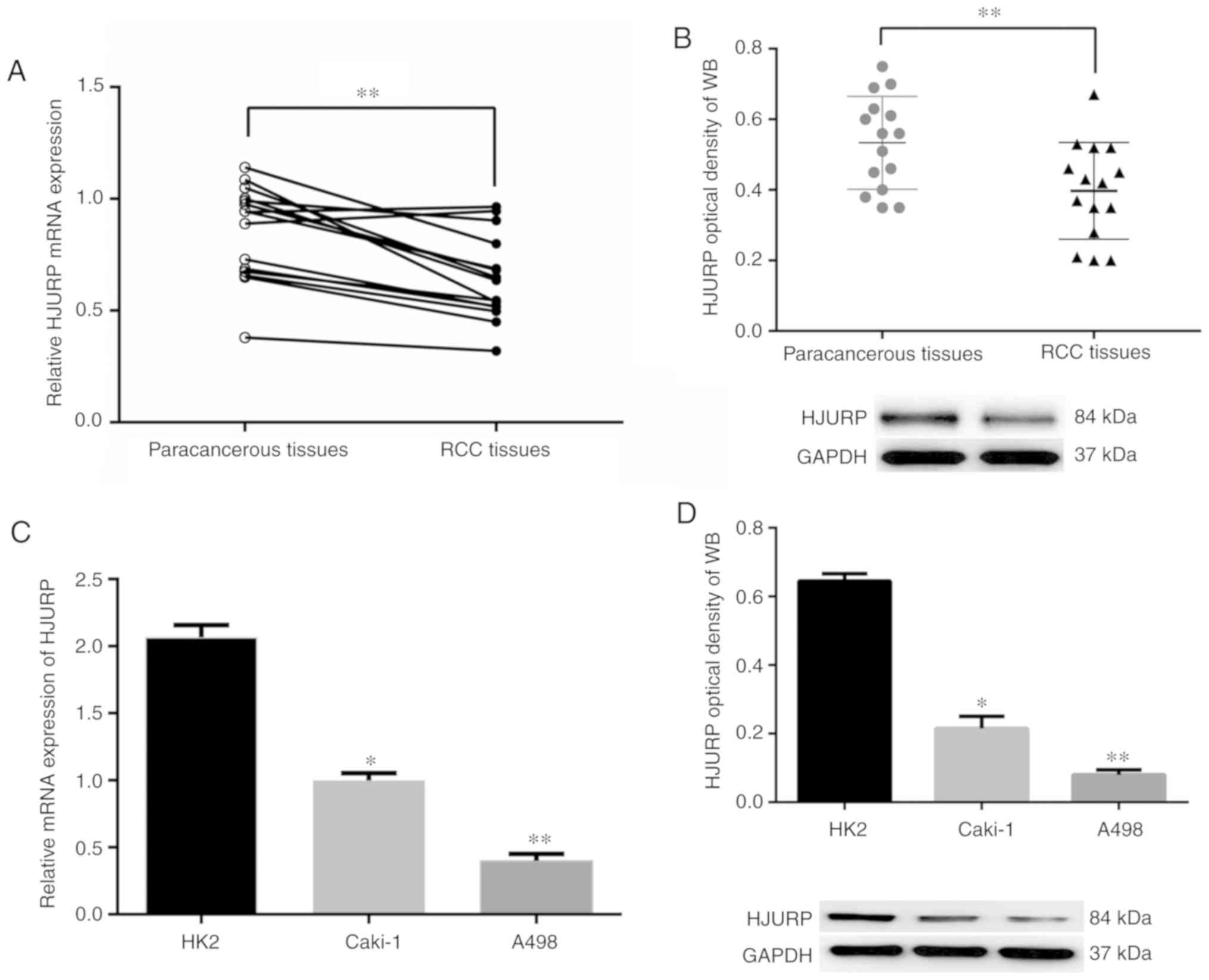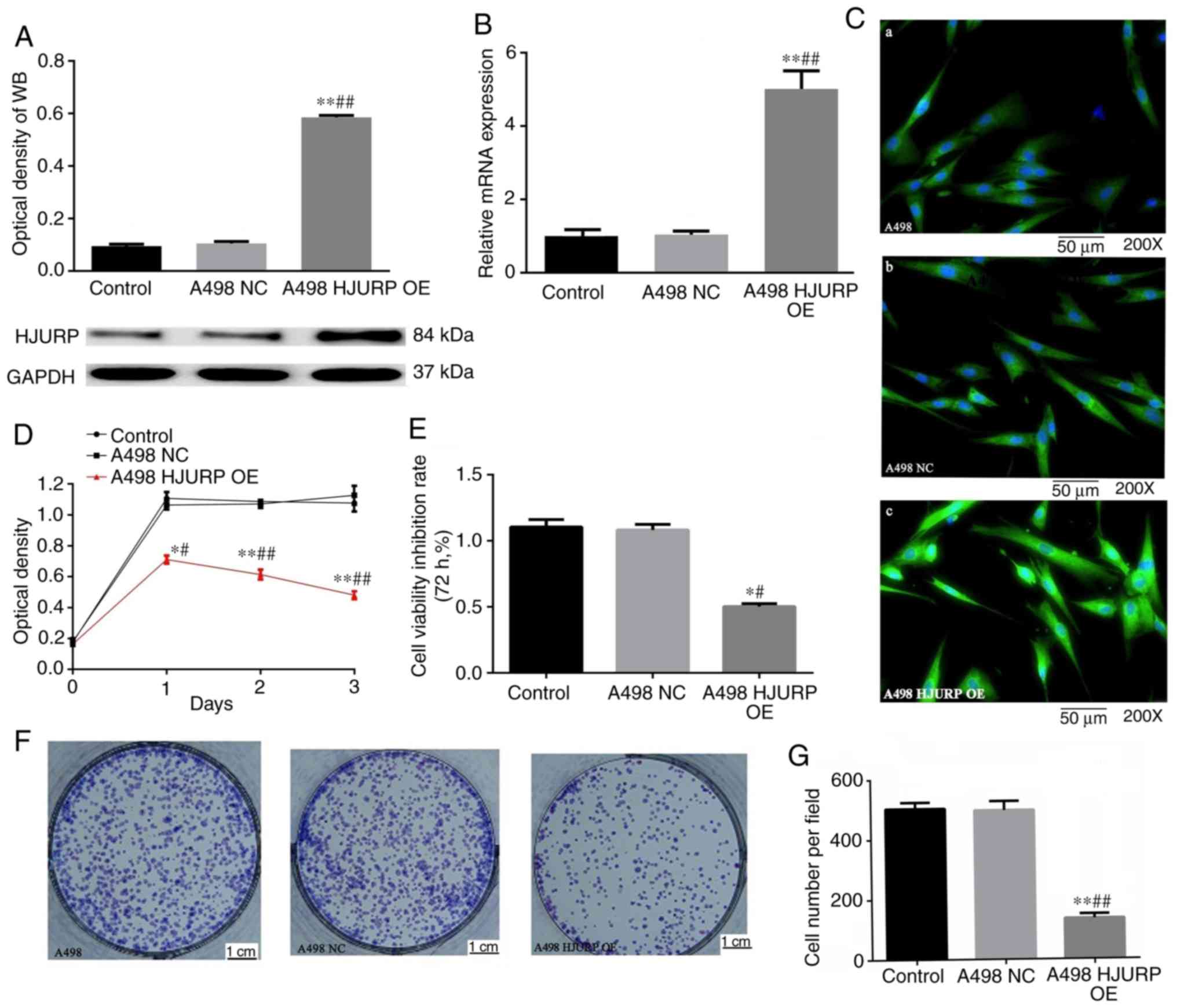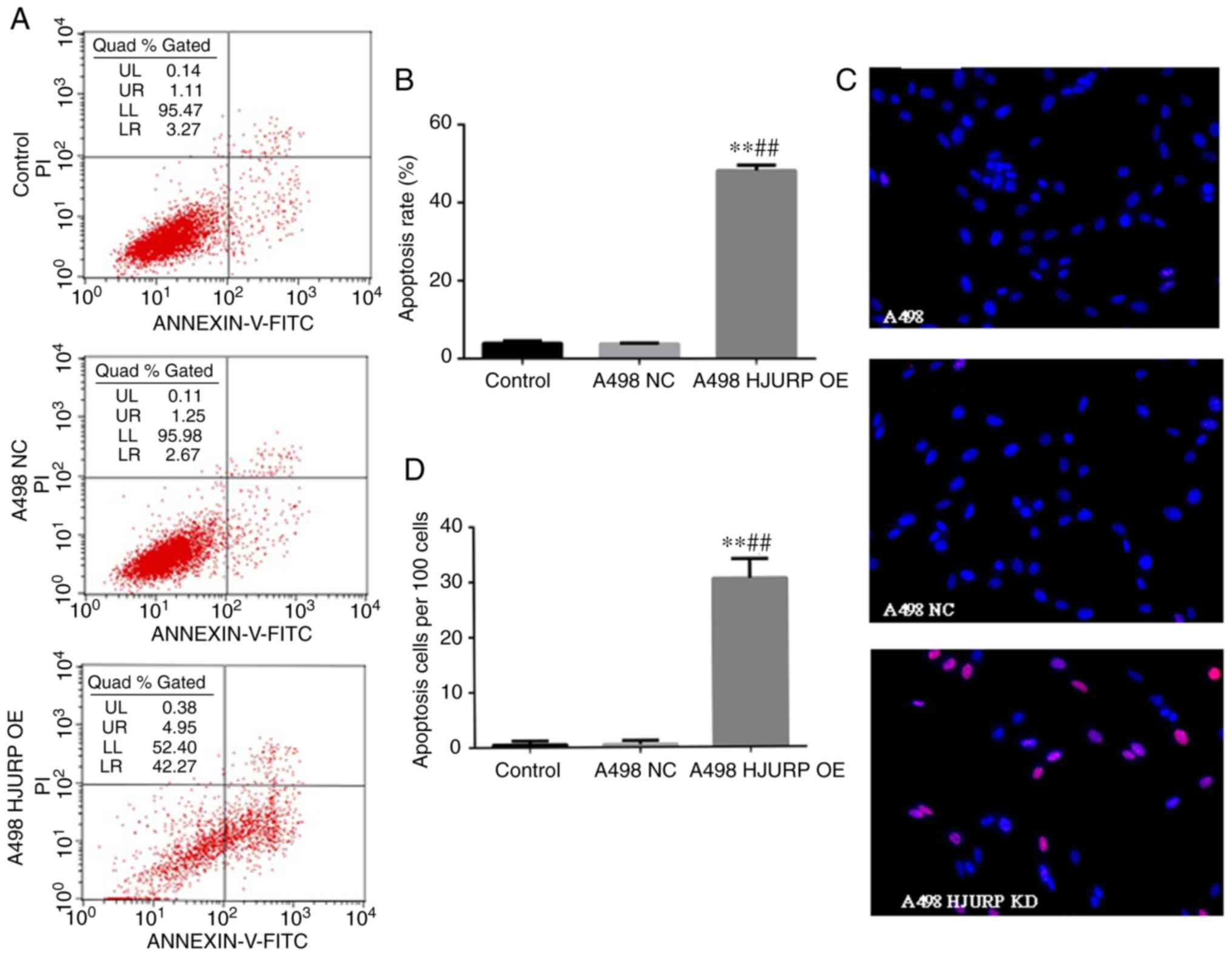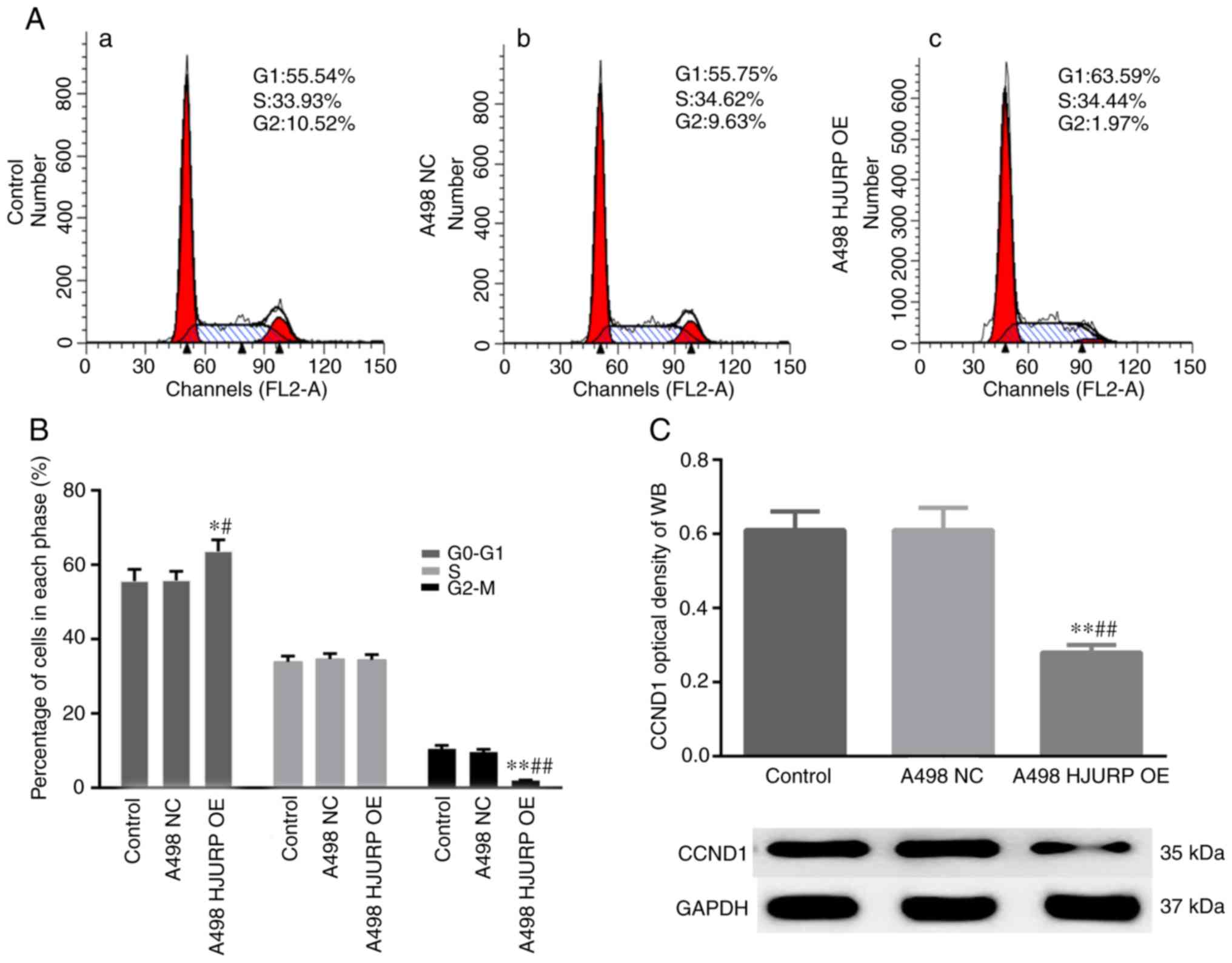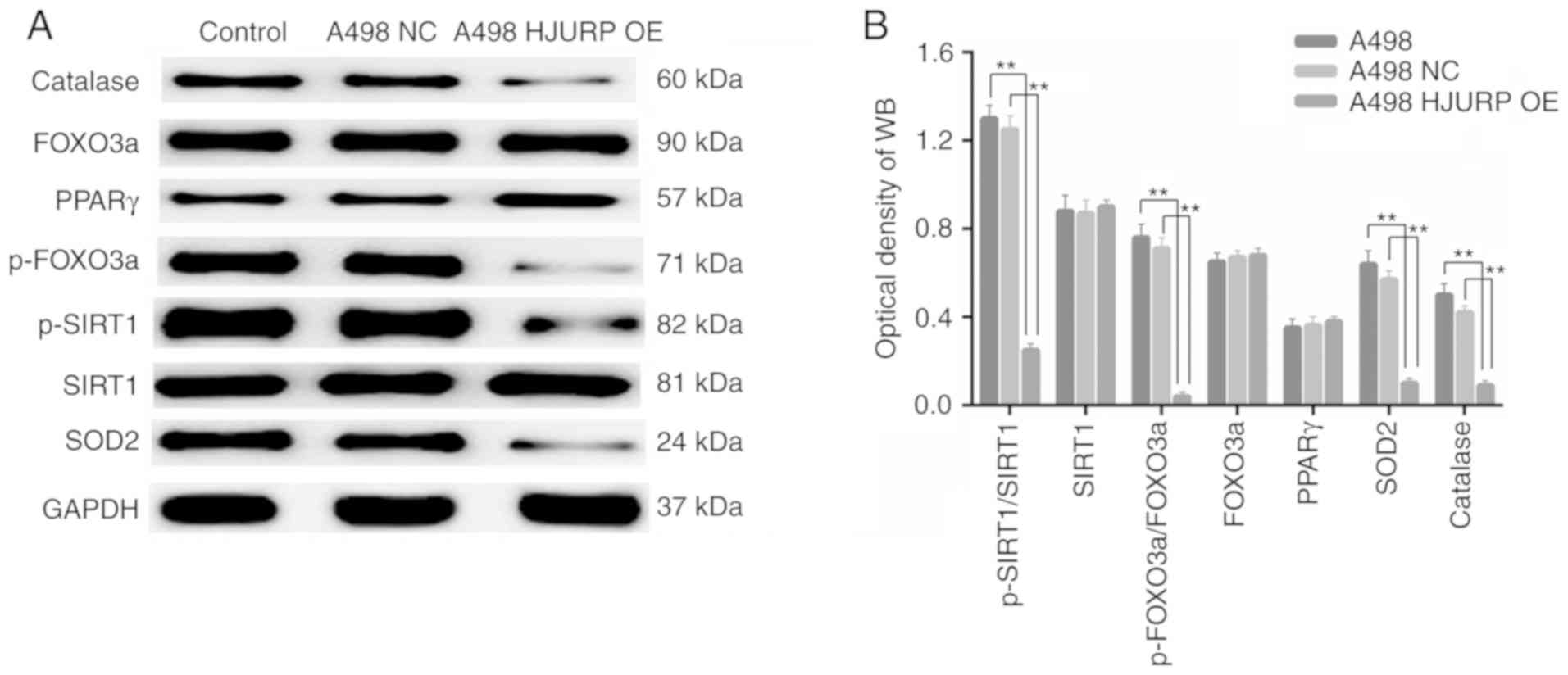|
1
|
Siegel RL, Miller KD and Jemal A: Cancer
statistics, 2018. CA Cancer J Clin. 68:7–30. 2018. View Article : Google Scholar : PubMed/NCBI
|
|
2
|
Capitanio U and Montorsi F: Renal cancer.
Lancet. 387:894–906. 2016. View Article : Google Scholar : PubMed/NCBI
|
|
3
|
Wei W, Lv Y, Gan Z, Zhang Y, Han X and Xu
Z: Identification of key genes involved in the metastasis of clear
cell renal cell carcinoma. Oncol Lett. 17:4321–4328.
2019.PubMed/NCBI
|
|
4
|
Kato T, Sato N, Hayama S, Yamabuki T, Ito
T, Miyamoto M, Kondo S, Nakamura Y and Daigo Y: Activation of
holliday junction recognizing protein involved in the chromosomal
stability and immortality of cancer cells. Cancer Res.
67:8544–8553. 2007. View Article : Google Scholar : PubMed/NCBI
|
|
5
|
Liu C and Mao Y: Diaphanous formin mDia2
regulates CENP-A levels at centromeres. J Cell Biol. 213:415–424.
2016. View Article : Google Scholar : PubMed/NCBI
|
|
6
|
Tachiwana H, Muller S, Blumer J, Klare K,
Musacchio A and Almouzni G: HJURP involvement in de novo CenH3
(CENP-A) and CENP-C recruitment. Cell Rep. 11:22–32. 2015.
View Article : Google Scholar : PubMed/NCBI
|
|
7
|
Perpelescu M, Hori T, Toyoda A, Misu S,
Monma N, Ikeo K, Obuse C, Fujiyama A and Fukagawa T: HJURP is
involved in the expansion of centromeric chromatin. Mol Biol Cell.
26:2742–2754. 2015. View Article : Google Scholar : PubMed/NCBI
|
|
8
|
Zhao H, Winogradoff D, Bui M, Dalal Y and
Papoian GA: Promiscuous histone mis-assembly is actively prevented
by chaperones. J Am Chem Soc. 138:13207–13218. 2016. View Article : Google Scholar : PubMed/NCBI
|
|
9
|
Mellone BG, Zhang W and Karpen GH: Frodos
found: Behold the CENP-A ‘Ring’ bearers. Cell. 137:409–412. 2009.
View Article : Google Scholar : PubMed/NCBI
|
|
10
|
Dunleavy EM, Roche D, Tagami H, Lacoste N,
Ray-Gallet D, Nakamura Y, Daigo Y, Nakatani Y and
Almouzni-Pettinotti G: HJURP is a cell-cycle-dependent maintenance
and deposition factor of CENP-A at centromeres. Cell. 137:485–497.
2009. View Article : Google Scholar : PubMed/NCBI
|
|
11
|
Foltz DR, Jansen LE, Bailey AO, Yates JR
III, Bassett EA, Wood S, Black BE and Cleveland DW:
Centromere-specific assembly of CENP-a nucleosomes is mediated by
HJURP. Cell. 137:472–484. 2009. View Article : Google Scholar : PubMed/NCBI
|
|
12
|
Shuaib M, Ouararhni K, Dimitrov S and
Hamiche A: HJURP binds CENP-A via a highly conserved N-terminal
domain and mediates its deposition at centromeres. Proc Natl Acad
Sci USA. 107:1349–1354. 2010. View Article : Google Scholar : PubMed/NCBI
|
|
13
|
Valente V, Serafim RB, de Oliveira LC,
Adorni FS, Torrieri R, Tirapelli DP, Espreafico EM, Oba-Shinjo SM,
Marie SK, Paçó-Larson ML, et al: Modulation of HJURP (Holliday
Junction-Recognizing Protein) levels is correlated with
glioblastoma cells survival. PLoS One. 8:e622002013. View Article : Google Scholar : PubMed/NCBI
|
|
14
|
Montes de Oca R, Gurard-Levin ZA, Berger
F, Rehman H, Martel E, Corpet A, de Koning L, Vassias I, Wilson LO,
Meseure D, et al: The histone chaperone HJURP is a new independent
prognostic marker for luminal A breast carcinoma. Mol Oncol.
9:657–674. 2015. View Article : Google Scholar : PubMed/NCBI
|
|
15
|
Cao R, Wang G, Qian K, Chen L, Qian G, Xie
C, Dan HC, Jiang W, Wu M, Wu CL, et al: Silencing of HJURP induces
dysregulation of cell cycle and ROS metabolism in bladder cancer
cells via PPARγ-SIRT1 feedback loop. J Cancer. 8:2282–2295. 2017.
View Article : Google Scholar : PubMed/NCBI
|
|
16
|
Chen T, Huang H, Zhou Y, Geng L, Shen T,
Yin S, Zhou L and Zheng S: HJURP promotes hepatocellular carcinoma
proliferation by destabilizing p21via the MAPK/ERK1/2 and AKT/GSK3β
signaling pathways. J Exp Clin Cancer Res. 37:1932018. View Article : Google Scholar : PubMed/NCBI
|
|
17
|
Bravaccini S, Tumedei MM, Scarpi E, Zoli
W, Rengucci C, Serra L, Curcio A, Buggi F, Folli S, Rocca A, et al:
New biomarkers to predict the evolution of in situ breast cancers.
Biomed Res Int. 2014:1597652014. View Article : Google Scholar : PubMed/NCBI
|
|
18
|
Coates P, Dewar J and Thompson AM: At
last, a predictive and prognostic marker for radiotherapy? Breast
Cancer Res. 12:1062010. View
Article : Google Scholar : PubMed/NCBI
|
|
19
|
Hu Z, Huang G, Sadanandam A, Gu S, Lenburg
ME, Pai M, Bayani N, Blakely EA, Gray JW and Mao JH: The expression
level of HJURP has an independent prognostic impact and predicts
the sensitivity to radiotherapy in breast cancer. Breast Cancer
Res. 12:R182010. View
Article : Google Scholar : PubMed/NCBI
|
|
20
|
Belfiore A, Genua M and Malaguarnera R:
PPAR-g agonists and their effects on IGF-I receptor signaling:
Implications for cancer. PPAR Res. 2009:8305012009. View Article : Google Scholar : PubMed/NCBI
|
|
21
|
Berger J and Moller DE: The mechanisms of
action of PPARs. Annu Rev Med. 53:409–435. 2002. View Article : Google Scholar : PubMed/NCBI
|
|
22
|
Vecchione G, Grasselli E, Voci A, Baldini
F, Grattagliano I, Wang DQ, Portincasa P and Vergani L: Silybin
counteracts lipid excess and oxidative stress in cultured steatotic
hepatic cells. World J Gastroenterol. 22:6016–6026. 2016.
View Article : Google Scholar : PubMed/NCBI
|
|
23
|
Li S, Zhou Q, He H, Zhao Y and Liu Z:
Peroxisome proliferator-activated receptor g agonists induce cell
cycle arrest through transcriptional regulation of Kruppel-like
factor 4 (KLF4). J Biol Chem. 288:4076–4084. 2013. View Article : Google Scholar : PubMed/NCBI
|
|
24
|
Yamamoto Y, Ono T, Dhar DK, Yamanoi A,
Tachibana M, Tanaka T and Nagasue N: Role of peroxisome
proliferator-activated receptor-gamma (PPARgamma) during liver
regeneration in rats. J Gastroenterol Hepatol. 23:930–937. 2008.
View Article : Google Scholar : PubMed/NCBI
|
|
25
|
Han L, Zhou R, Niu J, McNutt MA, Wang P
and Tong T: SIRT1 is regulated by a PPAR{g}-SIRT1 negative feedback
loop associated with senescence. Nucleic Acids Res. 38:7458–7471.
2010. View Article : Google Scholar : PubMed/NCBI
|
|
26
|
Picard F, Kurtev M, Chung N, Topark-Ngarm
A, Senawong T, Machado De Oliveira R, Leid M, McBurney MW and
Guarente L: Sirt1 promotes fat mobilization in white adipocytes by
repressing PPAR-gamma. Nature. 429:771–776. 2004. View Article : Google Scholar : PubMed/NCBI
|
|
27
|
Vaziri H, Dessain SK, Ng Eaton E, Imai SI,
Frye RA, Pandita TK, Guarente L and Weinberg RA: hSIR2 (SIRT1)
functions as an NAD-dependent p53 deacetylase. Cell. 107:149–159.
2001. View Article : Google Scholar : PubMed/NCBI
|
|
28
|
Clark MJ, Homer N, O'Connor BD, Chen Z,
Eskin A, Lee H, Merriman B and Nelson SF: U87MG decoded: The
genomic sequence of a cytogenetically aberrant human cancer cell
line. PLoS Genet. 6:e10008322010. View Article : Google Scholar : PubMed/NCBI
|
|
29
|
Pleasance ED, Cheetham RK, Stephens PJ,
McBride DJ, Humphray SJ, Greenman CD, Varela I, Lin ML, Ordóñez GR,
Bignell GR, et al: A comprehensive catalogue of somatic mutations
from a human cancer genome. Nature. 463:191–196. 2010. View Article : Google Scholar : PubMed/NCBI
|
|
30
|
Stephens PJ, McBride DJ, Lin ML, Varela I,
Pleasance ED, Simpson JT, Stebbings LA, Leroy C, Edkins S, Mudie
LJ, et al: Complex landscapes of somatic rearrangement in human
breast cancer genomes. Nature. 462:1005–1010. 2009. View Article : Google Scholar : PubMed/NCBI
|
|
31
|
Eble JN, Sauter G, Epstein JI and
Sesterhenn IA: Pathology and genetics of tumours of the urinary
system and male genital organs. (1st). IARC Press. (Lyon). 12–43.
2004.
|
|
32
|
Livak KJ and Schmittgen TD: Analysis of
relative gene expression data using real-time quantitative PCR and
the 2(-Delta Delta C(T)) method. Methods. 25:402–408. 2001.
View Article : Google Scholar : PubMed/NCBI
|
|
33
|
Capitanio U, Bensalah K, Bex A, Boorjian
SA, Bray F, Coleman J, Gore JL, Sun M, Wood C and Russo P:
Epidemiology of renal cell carcinoma. Eur Urol. 75:74–84. 2019.
View Article : Google Scholar : PubMed/NCBI
|
|
34
|
Chow WH, Dong LM and Devesa SS:
Epidemiology and risk factors for kidney cancer. Nat Rev Urol.
7:245–257. 2010. View Article : Google Scholar : PubMed/NCBI
|
|
35
|
Hu B, Wang Q, Wang Y, Chen J, Li P and Han
M: Holliday junction-recognizing protein promotes cell
proliferation and correlates with unfavorable clinical outcome of
hepatocellular carcinoma. Onco Targets Ther. 10:2601–2607. 2017.
View Article : Google Scholar : PubMed/NCBI
|
|
36
|
Wei Y, Ouyang GL, Yao WX, Zhu YJ, Li X,
Huang LX, Yang XW and Jiang WJ: Knockdown of HJURP inhibits
non-small cell lung cancer cell proliferation, migration, and
invasion by repressing Wnt/β-catenin signaling. Eur Rev Med
Pharmacol Sci. 23:3847–3856. 2019.PubMed/NCBI
|
|
37
|
Chen YF, Liang YX, Yang JA, Yuan DZ, Li J,
Zheng SS, Wan YP, Wang B, Han ZD and Zhong WD: Upregulation of
holliday junction recognition protein predicts poor prognosis and
biochemical recurrence in patients with prostate cancer. Oncol
Lett. 18:6697–6703. 2019.PubMed/NCBI
|
|
38
|
Serafim RB, Cardoso C, Di Cristofaro LFM,
Pienna Soares C, Araújo Silva W Jr, Espreafico EM, Paçó-Larson ML,
Price BD and Valente V: HJURP knockdown disrupts clonogenic
capacity and increases radiation-induced cell death of glioblastoma
cells. Cancer Gene Ther. 27:319–329. 2020. View Article : Google Scholar : PubMed/NCBI
|
|
39
|
Liu J, Zhou J, Wu Z, Wang X, Liu L and Yao
C: Cyanidin 3-O-beta-glucoside ameliorates ethanol-induced acute
liver injury by attenuating oxidative stress and apoptosis: The
role of SIRT1/FOXO1 signaling. Alcohol Clin Exp Res. 40:457–466.
2016. View Article : Google Scholar : PubMed/NCBI
|
|
40
|
Ruan Y, Dong C, Patel J, Duan C, Wang X,
Wu X, Cao Y, Pu L, Lu D, Shen T and Li JL: SIRT1 suppresses
doxorubicin-induced cardiotoxicity by regulating the oxidative
stress and p38MAPK pathways. Cell Physiol Biochem. 35:1116–1124.
2015. View Article : Google Scholar : PubMed/NCBI
|
|
41
|
Circu ML and Aw TY: Reactive oxygen
species, cellular redox systems, and apoptosis. Free Radic Biol
Med. 48:749–762. 2010. View Article : Google Scholar : PubMed/NCBI
|
|
42
|
Wang Y, Liang X, Chen Y and Zhao X:
Screening SIRT1 activators from medicinal plants as bioactive
compounds against oxidative damage in mitochondrial function. Oxid
Med Cell Longev. 2016:42063922016. View Article : Google Scholar : PubMed/NCBI
|
|
43
|
Wang Q, He G, Hou M, Chen L, Chen S, Xu A
and Fu Y: Cell cycle regulation by alternative polyadenylation of
CCND1. Sci Rep. 8:68242018. View Article : Google Scholar : PubMed/NCBI
|
|
44
|
Guardavaccaro D, Corrente G, Covone F,
Micheli L, D'Agnano I, Starace G, Caruso M and Tirone F: Arrest of
G(1)-S progression by the p53-inducible gene PC3 is Rb dependent
and relies on the inhibition of cyclin D1 transcription. Mol Cell
Biol. 20:1797–1815. 2000. View Article : Google Scholar : PubMed/NCBI
|
|
45
|
Musgrove EA, Lee CS, Buckley MF and
Sutherland RL: Cyclin D1 induction in breast cancer cells shortens
G1 and is sufficient for cells arrested in G1 to complete the cell
cycle. Proc Natl Acad Sci USA. 91:8022–8026. 1994. View Article : Google Scholar : PubMed/NCBI
|















